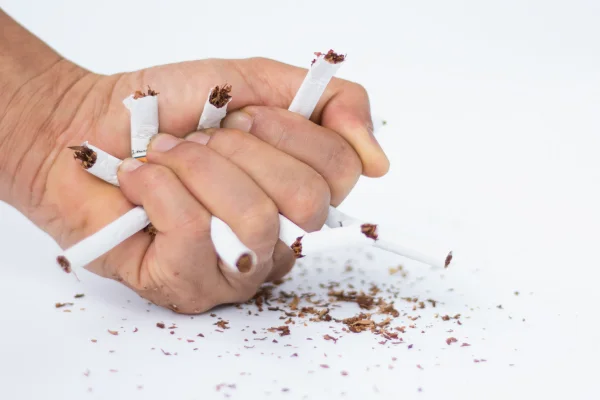You’ve probably heard many reasons of why you should cut down or stop smoking. From reducing the chance of developing diseases like lung cancer, to improving your blood circulation (giving you more energy). But did you know that some research has suggested that tobacco use and nicotine dependence could be connected to bruxism?

National No Smoking Day – can smoking cause teeth grinding?
Whilst the link between bruxing and smoking isn’t yet completely proven, heavy smokers are more than twice as likely to be weekly bruxers compared to non-smokers.
How could smoking lead to teeth grinding?
Scientists have different theories on the link between smoking and bruxism. However, the key to these theories are dopamine levels. Dopamine is a chemical sent to our brain that makes us feel good.
This “feel good” hormone is one of the components behind bruxism, and is involved in many of our body functions. This includes digestion, blood flow and pain processing.
When your brain experiences changes in the levels of dopamine in your brain, your motor activity levels increase. This can lead to grinding and clenching. Smoking more frequently increases dopamine release in your body, and affects your motor activity.
5 top tips to help you stop smoking
It can be difficult to break long-term habits, but making small lifestyle changes can get you started on your journey to a smoke-free life.
1. Positive mindset
Think positive, do positive. You may have tried to quit before, but don’t let this put you off. Make a list of reasons of why you want to stop, and look back on it when you’re struggling.
2. Make a plan
Set a date to quit smoking and stick to it. It’s a great way to mentally prepare yourself.
3. Buddy up
If you can, grab a friend that’s also thinking of quitting. You can keep each other motivated and won’t feel as alone.
4. Keep your hands and mouth busy
Nicotine replacement therapy (NRT) can double your chances of success. As well as patches, there are tablets, lozenges, gum and a nasal spray. And if you like holding a cigarette, there are handheld products like the inhalator or e-cigarettes.
5. Get moving
A review of scientific studies has proved that exercise – even a 5-minute walk or stretch – cuts cravings. It may even help your brain produce anti-craving chemicals.
Take your first step
Talk to your GP
Many people don’t realise that their GP can help them quit. They can enroll you in a “stop smoking” clinic, and prescribe nicotine replacement therapy.
Join your local stop smoking service
You’re up to 4 times more likely to quit successfully with the help of a local stop smoking service. Find your nearest NHS Stop Smoking Service from the NHS Smokefree website, or call the Smokefree National Helpline on 0300 123 1044 to speak to a trained adviser.
Consider using a nicotine product
Your GP can offer you nicotine replacement therapy (NRT). You might also consider trying e-cigarettes. While they’re not completely risk-free, they’re much safer than cigarettes and can help people stop smoking.
Find online support
Visit the NHS Better Health website for online support including apps, communities and motivational emails.
Ditch the cigarettes on National No Smoking Day 2022, and get one step closer to a brux-free life.
